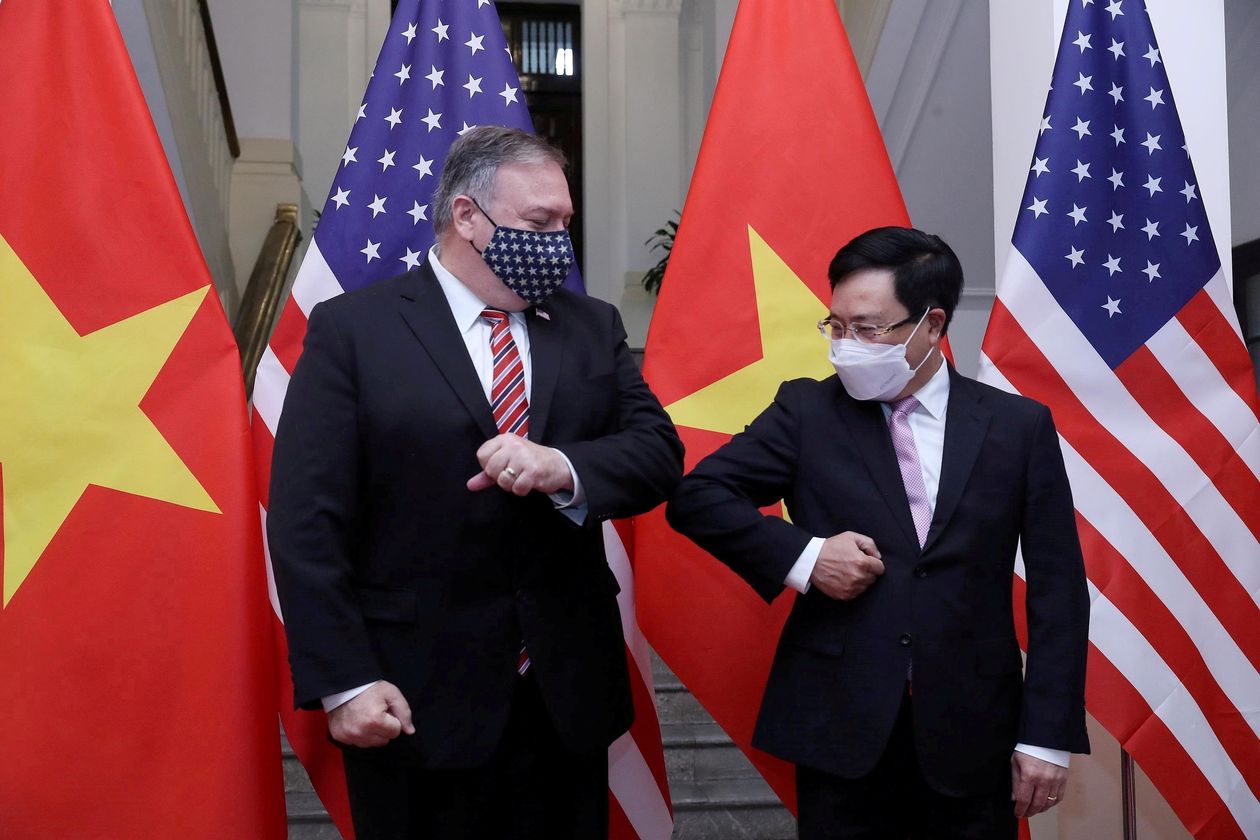

(PHOTO: LAM KHANH/VNA/REUTERS)Knock KnockU.S. Secretary of State Mike Pompeo set out this week on a 5-day "China-Knocking" tour of South East Asia, sharply critiquing Beijing at every stop. The Secretary visited India, Sri Lanka, the Maldives, Indonesia, and ended his tour in Vietnam. Throughout the trip, he spoke vocally against China on a range of issues, including human rights, the South China Sea, and Taiwan, furthering the Trump administration's 'hard on China' message.
At one point while visiting Sri Lanka, Sec. Pompeo commented that the Chinese Communist Party was behaving like a "predator" in the region. "We see from bad deals, violations of sovereignty and lawlessness on land and sea that the Chinese Communist Party is a predator, and the United States comes in a different way, we come as a friend, and as a partner," Pompeo said at a televised conference.
Chinese Foreign Ministry spokesperson Wang Wenbin mentioned that Sec. Pompeo's "lies and smears" wouldn't affect China's commitment to peaceful development in the region.
For more on developments in the region, read "A Look at the South China Sea" by Hu Bo, Director at the South China Sea Strategic Situation Probing Initiative.
 Ballots in the Balance
Ballots in the BalanceWith the U.S. election looming, expectations around what the U.S.-China relationship will look like under four more years of Trump, or a new Biden administration, are keeping scholars and diplomats alike on their toes.
With the pandemic, talk of decoupling, scars of the trade war, and rising military tension in the region, the U.S. election may change the tide in U.S.-China affairs. Wang Yiwei, director of the Institute of International Affairs at Renmin University, commented that "if Biden wins, he may take a multilateral approach, more coherence with U.S. alliances. If Trump wins, he'll definitely continue harsh policies toward China."
Many experts believe the significance of this election on the bilateral relationship cannot be understated, as complex issues hang in the balance– global health, climate change, nuclear proliferation, human rights– and more regional issues such as the South China Sea and Taiwan.
For more on the future of the bilateral relationship, read "The Deception and Detriment of Decoupling" by Cheng Li Director, John L. Thornton China Center, The Brookings Institution, and Ryan McElveen Associate Director, John L. Thornton China Center, Brookings Institution.
 Years in the Making
Years in the MakingChinese leadership met this week to plan for its next five years, releasing a roadmap for its fourteenth five-year plan. In its plans, China aims to boost GDP per person to the level of moderately developed countries by 2035, and is working towards sustained economic growth through 2025.
This meeting also underscored President Xi's ambition towards self-reliance in tech, military, and economic power. The ambitious goals come at a time when most nations are strictly focusing on combating the pandemic– which is seeing a resurgence in the U.S. and E.U. – and as the U.S. is restricting China's access to American technology amid rising military and economic tension. In China, however, where the coronavirus has been largely under control in recent months, China's economy returned to 4.9% growth last quarter, and exports have also recovered, enabling the country to focus on broader goals for now.
Prepared by China-US Focus editorial teams in Hong Kong and New York, this weekly newsletter offers you snap shots of latest trends and developments emerging from China every week, while adding a dose of historical perspective.
- 2020-10-24 Looking Back and Moving Forward
- 2020-10-16 COVID Cluster
- 2020-10-10 Election Looming
- 2020-10-03 Golden Week Kicks Off
- 2020-09-26 Virtual Diplomacy
- 2020-09-18 Digital Domain
- 2020-09-12 Reframing the Ground Rules
- 2020-09-05 Reciprocity in Action
- 2020-08-29 Who’s Tougher on China?
- 2020-08-22 To Talk, Or Not To Talk
- 2020-08-15 Domestic Circulation
- 2020-08-07 Fraying Relations
- 2020-08-01 Turning Tides
- 2020-07-24 Up in Smoke
- 2020-07-17 Status Stripped
- 2020-07-10 A Historic Moment
- 2020-07-03 Handover Tested
- 2020-06-27 Relationship Spiral
- 2020-06-20 Bolton Bombshell
- 2020-06-13 Fits and Starts